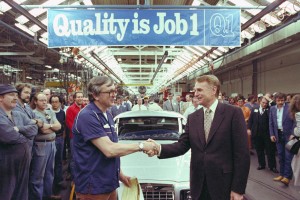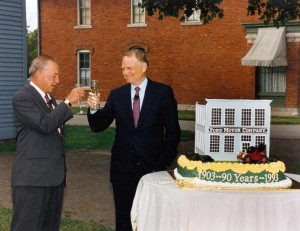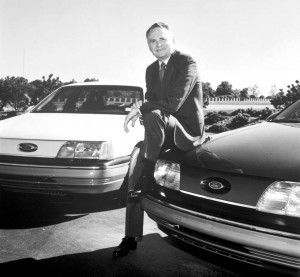He oversaw the nation’s second largest automaker during one of the most critical points in the industry’s history, acknowledging changing times with massive plant cuts but also approving a string of critical new products that helped reassert Ford Motor Co. as an industry leader. This week, 26 years after his retirement, Harold Arthur Poling died at his home in California at the age of 86.
Better known as “Red,” Poling liked to say he “bled Ford blue,” having spent 43 years rising through the ranks at the Dearborn-based maker, starting as an intern at an old Ford steel mill. He was a finance man who also had a deep love of product, at one point taking classes in high-performance driving so he could better relate to vehicles like the Ford Mustang.
“Red Poling was an extraordinary leader who had a profound impact on Ford Motor Co. and everyone who worked with him,” Bill Ford, executive chairman of Ford said in a statement. “Red was respected by all for his leadership, his passion for being the low-cost producer and his genuine affinity for people.”

Red Poling closed 8 plants during his tenure but also provided the surviving plants with some critical new products, including the Taurus and the Explorer.
One of four children, Poling grew up in the Detroit suburb of Troy, the son of an auto mechanic, and fondly recalled watching his father work on cars. He was ultimately drawn to the business, but spent most of that career on the white-collar side.
Poling enlisted in the Navy and after finishing his service headed to New Jersey’s Monmouth College for his bachelor’s degree. He followed up with an MBA at Indiana University.
Recruited to Ford, he spent a summer in the blazing hot steel mill at Ford’s then sprawling Rouge Complex outside Detroit – a mill that would later be sold off as part of cuts Poling initiated as CEO.
But the young and eager graduate found his calling shortly afterwards, landing a full-time job as a cost analyst in the Steel Division’s controller’s office. Poling developed and long maintained a reputation as a financial wizard who could deftly – often ruthlessly – cut costs.
It was an era when executives rarely jumped from one company to another. But those on the proverbial fast track were expected to change positions every 18 to 24 months and Poling eventually worked his way through almost every corner of the company before landing the critical role as head of North American operations in the late 1970s and then moving up to president.

Then-Chairman Red Poling (r) with William Clay Ford Sr. celebrate the company's 90th birthday in 1993.
In that role he was the understudy of Chairman Donald Petersen and together the two men deftly steered the maker through some of the worst financial problems in its history. Together, they launched the original 1986 Taurus, which one analyst described at the time as the “you-bet-your-company car.” Critics derided its breakthrough shape as “jellybean styling,” but consumers loved it and for a couple years Taurus regained the lead as America’s best-selling passenger car. It would be the last time a Detroit maker was in that position.
A favorite of the media and industry analysts alike, Petersen’s unexpected retirement – for reasons that have never been fully explained – led to Poling’s ascension to the chairman’s post on March 1, 1990. He had already spent 11 years on the Ford Board of Directors.
While Taurus had provided a lifeline to Ford the maker still faced a series of challenges during Poling’s tenure in the top spot. Saddled with tremendous overcapacity he was forced to close eight plants and eliminate tens of thousands of jobs. And he spent much of his time strategizing how to offset the steady gains of Japanese makers like Toyota and Honda, both of whose products would soon topple the king-of-the-hill Taurus.
Poling was convinced of Detroit’s ability to regain its long leadership role, once proclaiming the domestic makers would “force the Japanese back into the sea.” It wasn’t to happen, but he approved a number of critical products that would give Ford a fighting chance, including the Explorer, an SUV that would soon be generating sales on a par with the likes of the Toyota Camry and Honda Accord.
He also came out with a controversial proposal to raise the federal gas tax by 25 cents, a move he – and several other Detroit industry leaders – felt would motivate American motorists to shift to more fuel-efficient vehicles. The strategy, which failed to gain traction in Washington, was ironic, as Poling helped usher in the so-called light truck boom, a shift to SUVs and pickups that generated some of the biggest profits Ford and the rest of Detroit’s Big Three have ever seen.
Poling was an avid and skilled golfer, a game he sought out as a way to relax after the typical week of 12 to 14 hour workdays. But even away from the office he was always Ford’s number one salesman – even after Poling’s retirement — recalls Paul W. Smith, host of a popular morning radio show on Detroit’s WJR.
Then new to the Motor City, Smith met Poling at an industry event and mentioned he was interested in the new Explorer. “When I got back to my office there were already three messages from Ford telling me they could find me a dealer,” recalled Smith – who bought an Explorer.
Poling retired in 1994 and was succeeded by his second-in-command, the Scottish Alex Trotman – who would quickly put in place the global restructuring known as Ford 2000.
After leaving the automaker Poling escalated golf to one of his top priorities. But he remained active through his 70s and into his 80s, serving as an advisor and board member with companies as diverse as Shell Oil and Kelloggs. He received a British knighthood and, in 1993, the Albert Schweitzer Leadership Award.
Red Poling spent his last days at a home in Pacific Grove, on California’s Monterey Peninsula. He is survived by his wife of 55 years, Miriam, two daughters and a son.

